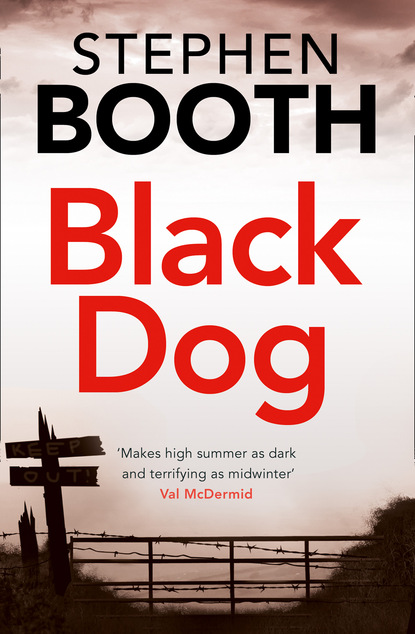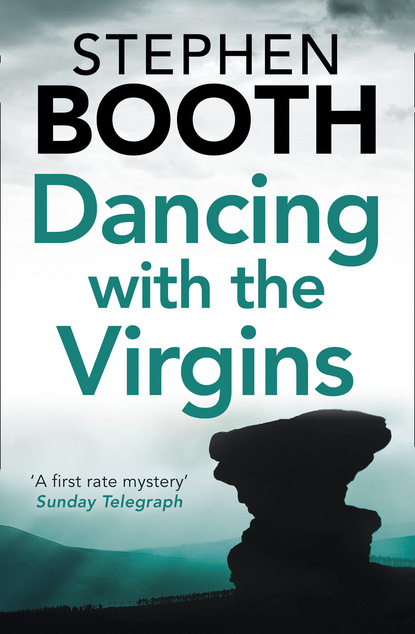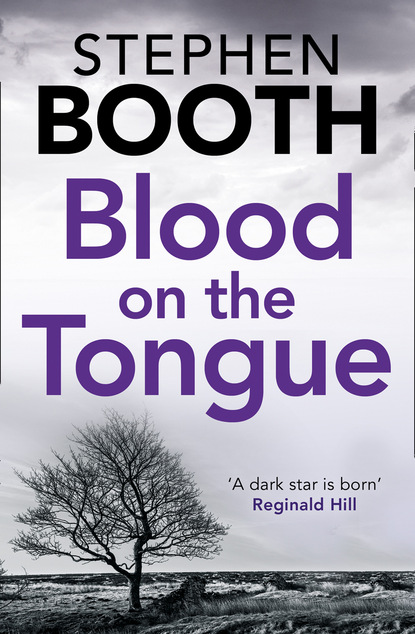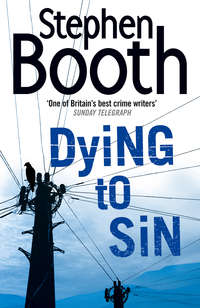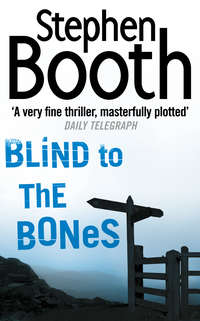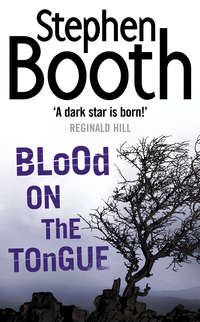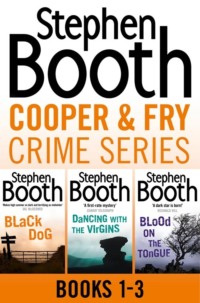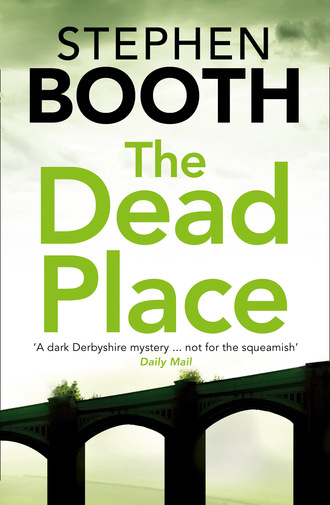
Полная версия
The Dead Place
She pushed the highlighted transcript across to the DI, who smiled. A cheap result.
‘As for the second message, some of the phrases don’t fit at all,’ said Dr Kane.
Fry was taken aback. In a speech written by someone so disturbed, it hadn’t occurred to her there might be some phrases that didn’t fit. Because none of it fit, did it? Not with anything rational.
‘Yes, of course,’ said Hitchens. He pulled his reading glasses out of his pocket and looked at the transcript with an intelligent smile. ‘Which phrases were you thinking of in particular, Doctor?’
‘“A cemetery six miles wide”, for example. What does that have to do with anything? It’s too specific.’
‘Anything else?’
‘Yes. “Here I am at its centre.” Also “the signs at the gibbet and the rock”. The most significant thing about these phrases is that all three of them occur in the second message, the one which is obviously scripted. In my opinion, he was making sure that he included those phrases. They were important, for some reason.’
‘“Six miles wide”,’ said Hitchens. ‘Do you think …?’
‘They’re clues,’ said Fry suddenly. ‘He’s left us some clues to a location. It’s a location within a six-mile radius of … Well, of what?’
‘His own position?’ said Dr Kane. ‘The place where he was making the call from?’
‘Of course. “Here I am at its centre.”’
She took off her glasses, and Hitchens did the same.
‘That would suggest he knew in advance where he was going to make the call,’ said the DI.
‘Is that a problem?’
‘Well, it isn’t the scenario we had in mind. We think he had the speech prepared, but not the location.’
‘It could be that he simply inserted an appropriate figure according to where he eventually made the call,’ said Dr Kane. ‘A six-mile radius? He might have driven around a specific area until he found somewhere suitable that he knew was within that range.’
Hitchens looked worried. ‘Damn it, he might just have been guessing at the three miles, in that case. How many people know even the approximate distance from one spot to another across the countryside? I don’t suppose he’s using GPS.’
‘And that’s only if he meant the distance as the crow flies, rather than the distance by road, which people might be more familiar with.’
Fry saw from the DI’s expression that he was starting to lose faith in his expert. Dr Kane seemed to be setting up more obstacles than she was helping to overcome. But experts loved to make things look more complex than they really were, didn’t they? It helped to justify their fees.
‘So what about the dead place?’ said Fry. ‘And the gibbet? The flesh eater?’
But the psychologist had begun to gather her papers together. ‘That’s your job, I believe. You have an individual here who’s trying to draw attention to himself, perhaps because he knows subconsciously that he needs help. Right now, he’s doing his best to assist you. His clues are a little obscure and ambiguous, certainly. That’s because he has to appear to be demonstrating his superior intelligence. But if you listen properly to what he’s telling you, I’m sure it will help you far more than I can at this stage.’
Dr Kane stood up ready to leave, then paused. She was looking at Fry, not at Hitchens, when she delivered her parting advice.
‘It’s generally true,’ she said, ‘that you can learn a lot by listening to what other people have to say.’
The regional manager for PNL Parking was called Hicks. Cooper found him in a cramped office on the street level with an attendant in a yellow fluorescent jacket.
‘We’re bound by all the rules, you know,’ said Hicks. ‘We have to register the CCTV system and make sure we’re compliant with the Data Protection Act.’
‘No one is suggesting you’ve broken any rules,’ said Ben Cooper for the third time.
But Hicks barely blinked. ‘Apart from anything else, footage won’t be accepted as evidence in court if we don’t comply with the rules,’ he said. ‘And registering the system means we have to deal with requests from people for copies of film.’
‘Do you get many requests?’
‘Some. A lot of them are too vague, though. They have to give us an idea of what time they might have been filmed, where they were and what they look like.’ He shrugged. ‘Most of them give up when they’re asked for details. They’re just fishing. And then there are some where we have to admit we didn’t film them at all, because the camera they saw was a dummy. Well, we don’t say dummy. We just say the camera wasn’t functioning at the time.’
‘And the camera on Level 8 would be one of those dummies?’ asked Cooper.
‘Yes.’
‘Has it always been non-functioning?’
‘For as long as I can recall.’ Hicks hesitated. ‘Yes, I’m pretty sure it was installed like that. It’s a bit ridiculous really, but at the time it was considered more economical. Cameras were supposed to be a deterrent, as much as anything else.’
‘I’d like to see any requests you have on file for copies of film from the camera on Level 8.’
‘As I said, we don’t give out copies of film from that camera, because it’s non-functioning.’
‘Exactly,’ said Cooper. ‘You know that, and I know that. And anyone who’s ever requested film from it must know that, too.’
Hitchens got up to escort Dr Kane out of the building, leaving Diane Fry on her own. She watched them walking away down the corridor, the DI’s hand lightly touching the doctor’s elbow as he chatted to her about his student days in Sheffield.
Fry knew that seeing visitors off the premises would normally be a job the DI delegated to somebody more junior. But for Dr Kane, Hitchens was making an exception. Probably because she was an expert and had to be treated with respect. Probably.
To prevent herself from thinking about it any more, Fry lowered her gaze and found herself staring at the yellow highlighter marks on the transcript in front of her. She wished she hadn’t used yellow. Now that the colour had dried, it looked faintly rancid and unhealthy, like a four-day-old bruise or a urine stain. Pink or orange would have been much more cheerful.
But who was she kidding? Whatever colour she chose wouldn’t make a bit of difference to the sly, evil look of the words themselves.
I can smell it right now, can’t you? It’s so powerful, so sweet. So irresistible.
She left the DI’s office and walked slowly back to the CID room. Ben Cooper wasn’t at his desk, but Gavin Murfin and a couple of other DCs were in, and they looked up as she entered.
As usual, there was a whiff of pastry from Murfin’s direction. Steak pie or Cornish pasty, she wasn’t sure. Right now, she wouldn’t have been able to identify it. Another, more elusive smell was in her nostrils, something rancid, unhealthy, yellow and evil. It was a smell she knew would only get closer and couldn’t be dispersed by the ventilation system.
I can smell it right now, can’t you? … It’s the scent of death.
‘Let’s get the map out,’ said Hitchens, almost before he could get back into the CID room. ‘We need the Ordnance Survey map, Diane – White Peak.’
‘We could use the mapping system on the computer,’ said Fry.
‘That’s no good for a six-mile radius. We won’t be able to see enough detail at that scale.’
He cleared a table while Fry found a copy of the right map and they spread it out.
‘Wardlow is here,’ said Hitchens. ‘Now we need a ruler to measure three miles in each direction. Damn it, the village is too close to the edge of the map – we’ll have to turn over to the other side. Why is everything you want to look at on an OS map always too close to the edge?’
Cooper came in as they were finding a ruler, and Hitchens called him. ‘Ben, just the lad we need. You know this area, I’m sure.’
‘Yes, sir. What is it you’re looking for?’
The DI explained, while Fry checked the scale of the map and used the ruler and a pen to draw a rough circle around the location of the public phone box in Wardlow, helpfully marked by the OS with a capital ‘T’ and a little blue handset.
‘Why the six-mile radius?’ asked Cooper.
‘We’ve got some clues from the tape. Or we think they’re meant as clues.’
Continuing the westward arc of her three-mile circle on to the other side of the map was tricky, but finally Fry managed it.
‘We’ll get somebody to do a proper job of it, but this will do for now,’ said Hitchens, oblivious to the exasperated look that Fry gave him. ‘What do you make of it?’
Cooper bent over the map. ‘Well, you’ve got an area that includes a dozen villages and one small town. Several dales on the western side, including part of the Wye Valley. The main A6 between Bakewell and Buxton is down here, and near the top there’s a smaller trunk road that cuts right across the A623.’
‘A busy area, would you say?’
‘Only parts of it, sir. The two main roads carry a lot of traffic. And there are some popular tourist spots, such as Tideswell and Monsal Head. And Eyam of course, on the eastern side.’
‘That’s the plague village, isn’t it?’
‘Plague?’ asked Fry.
‘Oh – Ben will tell you the story some time.’
‘I’ll look forward to it.’
Cooper moved a hand across the map, spanning his fingers over tight clusters of contour lines and long bands of green woodland. ‘But there are much quieter corners here, too. This is part of the Derbyshire Dales Nature Reserve. Only walkers can get into some of these smaller dales, and the woods on the valley sides are quite dense. What roads there are tend to be single track and too narrow to take a vehicle of any size. On the other hand, the eastern and northern parts are limestone plateau. That’s farming country, with a few small villages and the odd abandoned quarry thrown in.’
Fry watched Cooper and Hitchens poring over the map. They looked like two schoolboys marshalling their armies of toy soldiers to act out a desktop battle.
‘We’re looking for somewhere within this area that might be referred to as “the dead place”,’ she reminded them.
Cooper stood up and drew a hand across his forehead. ‘The possibilities are endless.’
Fry sighed. ‘Ben, that isn’t what we wanted to hear.’
‘I’m sorry.’
‘It’s not your fault,’ said Hitchens. ‘Let’s think about this logically. What are the possibilities.’
‘“The dead place” …’ said Fry. ‘Well, does he mean the place itself is dead, or is he referring to a place for the dead.’
‘As in a cemetery?’ said Cooper.
‘Hold on, let’s take the first option,’ said Hitchens. ‘What did you say – where the place itself is dead?’
‘Yes. It depends what sort of bee he has in his bonnet.’
‘What do you mean?’
‘Well, it could be some kind of anti-quarry protest, or some farmer driven to the end of his tether by Foot and Mouth Disease. Are there any disposal pits for incinerated cattle around here?’
‘Not that I know of. Foot and Mouth never reached these parts, but there were some farms affected down on the Staffordshire border.’
‘Factory closures, then. Any major employers gone under?’
‘Not since the pits closed in the east of the county. Lots of communities almost died out there. But not here.’
‘Toxic waste dumps?’
‘OK, wait … yes, there’s one near Matlock.’
Hitchens shook his head. ‘Too far. It’s way outside of the six-mile zone.’
‘What about a place for the dead, then?’ said Fry. ‘A cemetery. What better place to hide a dead body than among hundreds of others?’
‘He’d still have to bury it, or conceal it in some way,’ said Cooper. ‘People visit cemeteries all the time. I’m sure they wouldn’t be used to seeing a fresh body left lying around.’
‘There must be some abandoned cemeteries,’ said Fry.
‘Well, plenty of closed churchyards. Most of the older ones are full now and don’t have room to expand. In a lot of villages they have to send you to the municipal cemetery, or to the crematorium.’
‘Mostly the crem these days, isn’t it? I don’t think I’ve ever been to a burial in my life. Everyone I’ve known who died has been cremated.’
‘But the churchyards are still there.’
‘OK. Anywhere else you can think of, Ben?’
‘It depends what you mean by a cemetery. There are plenty of burial places, some of them thousands of years old – Neolithic sites, remains of chambered cairns. A lot of them are in fairly remote locations, but hikers like to visit the more historic sites. You couldn’t leave a body in full view for long without it being discovered.’
‘Like the Nine Virgins,’ said Fry.
‘Exactly.’
Cooper remembered the Nine Virgins well. The body of a murdered mountain biker left inside the stone circle had been found within minutes of her death. No such luck in this case, though.
‘Some sites aren’t so well known, of course,’ he said. ‘There’s the Infidels’ Cemetery, for example.’
‘The what?’
‘The Infidels’ Cemetery. Oh, it’s really a tiny, neglected nineteenth-century graveyard on the road between Ashford in the Water and Monsal Head. Last time I saw the place, it was waist high with nettles and weeds. And it’s in the middle of nowhere – you’d drive right by without knowing it was there.’
‘And why is it there?’
‘I think it was actually the graveyard for a community of Baptists. They weren’t regarded very highly by their neighbours, I suppose.’
‘Why “infidels”?’
‘Well, the story is that the inscriptions were recorded by a local historian, who noticed that none of the epitaphs contained references to the Bible, God or Jesus. That was so unusual at the time that it was considered very suspicious.’
‘Between Ashford in the Water and Monsal Head?’ Fry remembered the DI mentioning Monsal Head. ‘It’s not far from Wardlow, then.’
‘Very close.’
‘Let’s go take a look. I’d like to get the lie of the land around Wardlow anyway.’
She looked at Hitchens, who nodded. ‘I can handle everything here. It’s going to be a question of waiting at the moment.’
‘Do you have time, Ben?’ asked Fry. ‘You’re the obvious candidate for a guide.’
‘I’ll get my coat.’
In the CID room, Gavin Murfin had seen Dr Kane leave after the meeting.
‘You know, I didn’t realize they made profilers so young,’ he said.
‘Actually, she doesn’t call herself a profiler,’ said Fry.
‘Oh no, of course not. Not since the Washington Snipers, and the Rachel Nickell case. Not to mention Soham, when the SIO took the wrong advice. Even profilers start to get themselves a bad name after too many disasters. So obviously they have to change their name to something else.’
For once, Fry didn’t try to shut him up. It was DI Hitchens who started to look annoyed. ‘As a matter of fact, DC Murfin, the real professionals have always tried to play down the hype that the press generate around psychological profiling. Dr Kane has asked us to refer to her simply as a specialist advisor because she wants to avoid publicity.’
‘To keep a low profile, in fact,’ said Murfin, and laughed.
Hitchens went a bit red around the ears. It was interesting to watch, because the DI was known as a man who found amusement in winding up his own senior officers. Some people said it was why he hadn’t made chief inspector by now.
‘Dr Kane is an investigative psychologist,’ he said. ‘She’s trained in behavioural science and criminology, so she can provide a useful insight into the investigative process. She’s been an advisor on a number of cases for other forces.’
Fry gave Murfin a warning glance, and he tried hard to look chastened. ‘No offender profile then, sir?’
Hitchens shook his head, still edgy. ‘We don’t have enough information at this stage. We don’t even know what sort of offence we’re looking at, if any.’
Murfin seemed to think about what else to say, then changed his mind and kept quiet. Hitchens waited for more comments, fidgeting a little, before turning to go back to his office.
‘Besides,’ he said, ‘she isn’t all that young. Thirty-three.’
7
Twenty minutes later, Cooper’s car was climbing out of Ashford in the Water. The River Wye took a sharp turn here as it came down from the north, so an observer standing at Monsal Head seemed to be looking up two separate valleys. A small road dropped down from a Bavarian-style hotel and an adjoining café before running north into the woods of Upperdale and Cressbrook Dale. To the south there was no road, only a footpath that clung to the slope for a while before slithering down to the river and crossing a bridge to the opposite bank.
A few walkers were on the five-arched viaduct that spanned the valley. The Wye narrowed as it ran underneath, and less adventurous visitors could be seen sitting on the banks of smooth grass enjoying an hour of September sunshine. But the walk down to the river was steep, and many people stayed to have lunch at the café or eat an ice cream while they enjoyed the view.
Fry shaded her eyes against the sun in the south-west. ‘What’s that place on the side of the hill up there? It looks like the ruins of a house.’
‘Hob Hurst’s House,’ said Cooper. ‘It isn’t really a house.’
‘And I suppose there was never really anyone called Hob Hurst?’
‘Well, no.’
‘How did I guess?’
‘It’s the name of a character in local folk stories. A goblin or a giant, I’m not sure which. What you can see there is actually the result of a landslip, but it does look like a ruined house from a distance, if you have a bit of imagination.’
‘Whoever built that hotel certainly had a bit of imagination,’ said Fry. ‘Some romantic Victorian, I suppose, fresh from a trip to the Alps.’
‘Probably. You know, when this viaduct was built for the railway line, there was a campaign against it. Everyone said it would ruin the view, just for the sake of getting from Bakewell to Buxton more quickly. Now it’s one of the most popular sights in the area.’
They almost passed the Infidels’ Cemetery without seeing it, although it was right by the roadside. Cooper had driven a few yards beyond it before he braked suddenly and reversed. Part of the wall that had once protected the graveyard had been knocked down. A wire fence was all that barred the gap, though the deep beds of stinging nettles behind it looked pretty hostile.
It was much quieter here than at Monsal Head. Across the valley they heard a shepherd calling to his dog, his voice a high, harsh cry like a moorland bird. Somebody was shooting on the opposite hill. As always in the countryside, the sound of gunfire didn’t seem out of place, let alone worth commenting on.
‘Well, nobody has been in this cemetery for months,’ said Fry. ‘Even I can tell that.’
‘They didn’t venture beyond the first couple of yards, anyway.’
Most of the ancient gravestones had fallen flat and were smothered with tangled goose grass and brambles. The stones that had stayed upright were coated in yellow lichen and shrouded in ivy that masked their familiar graveyard shapes. The only exceptions were the two stones nearest the road. Someone had cleared the ivy from them, revealing their inscriptions.
With difficulty, Cooper read the name and dates on one of the stones.
‘I don’t think this person was much appreciated in his day,’ he said. ‘“Though man’s envy may thy worth disdain, Still conscious uprightness shall fill thy breast.” I might suggest that one to Gavin for his epitaph.’
‘Why? Is he feeling under-appreciated?’
‘I think so.’ Cooper moved a few yards to the side. ‘Diane, look at this one.’
Only a small patch had been cleared in the ivy covering the second stone. It had been done quite recently, too. The broken stems were still shredded and oozing a little sap when Cooper touched them.
‘That’s a bit odd,’ he said.
‘Why?’
‘Well, I was assuming that whoever cleared the ivy from these stones was an amateur historian, trying to confirm the names of people buried here. Or maybe a relative who wanted an ancestor to be remembered, not just lost in the undergrowth.’
‘Seems reasonable,’ said Fry.
‘But look at this – the name and dates haven’t been exposed, just the inscription after them. It’s only a short one, too. Caro data vermibus. What does that mean?’
‘I’ve no idea.’
‘You’re the educated one.’
‘Ben, I took a degree in Criminal Justice and Policing at the University of Central England. It didn’t make me fluent in Latin.’
Cooper walked backwards and forwards in front of the stones, but beyond the first few feet of ground from the road the blanket of nettles and brambles was dense and unbroken. He watched a butterfly flit among the nettles.
Impatiently, Fry walked back to the entrance and looked up the road. ‘How near is this to Wardlow, did you say?’
‘Only a couple of miles.’
In the language of Derbyshire place names, ‘low’ always meant ‘high’. So this particular village must have been named after the lookout hill, Wardlow Cop, whose flattened conical shape appeared on their left as they began the descent from Monsal Head.
Wardlow itself was just as DI Hitchens had described it – a series of farms and houses scattered along one road. It was bordered on both sides by long, narrow strips of pasture land, preserved in their medieval patterns by drystone walls, networks of them strung across the fields and climbing the hills. Some parts of the White Peak plateau were said to have twenty-four miles of wall for every square mile of farmland. Instead of regular field patterns, the eye was likely to see a confusing geometry of stone, long courses of wall exaggerating every contour in the landscape.
Some of the farms at Wardlow had been converted into homes, but others were still working. A tractor turned out of a yard as they reached the start of the village, where two Union Jacks were flying. Cooper noticed that the village pub was closed during the day, like so many in places without much tourist trade. The Church of the Good Shepherd was just beyond a cattery operating from a cluster of surplus farm buildings. It was a small stone church with a slate roof and leaded windows, but no tower. Anything bigger would have been out of place.
They finally found space wide enough to park alongside someone’s hedge without blocking the road completely, and they crossed to the church. Through double gates they walked into a grassed area, where a pair of stocks stood near the rear wall. Cooper didn’t think they were medieval – more likely erected for a village fête some time in the last few decades. A chance to throw wet sponges at the vicar, rather than rotten eggs at a convicted felon. Ritual humiliation, all the same.
Behind the church was the graveyard itself, small and under-used. There’d be no need to close this one to burials for a few years yet.
‘Melvyn Hudson said there were very few funerals in Wardlow,’ said Fry.
‘He’s from the funeral directors, Hudson and Slack?’
‘That’s right.’
‘Well, I’m sure Mr Hudson is right. A lot of these graves date back to Victorian times.’
Several large sycamores and beeches darkened the top end of the graveyard, and nothing grew underneath the trees. Even their own seedlings had sprouted and died in the barren ground. Dead branches, beech nuts and small stones crunched under their feet as they walked among the gravestones. Swallows swooped around them, diving almost to the ground in pursuit of the small flies that hung in clouds over the graves. The Victorian graves were surrounded by low iron railings, rusted and falling apart in the damp air.
‘Here’s the deceased councillor,’ said Cooper. ‘Mrs Sellars, right? It’s by far the newest burial here.’
‘OK. Now, where’s the phone box?’
‘The other side of the church.’
A small parish room was attached to the church, a kitchen visible through a window piled with jars, cutlery and old newspapers. As they walked past it towards the phone box, Cooper saw a movement inside a house directly across the road. It was no more than a shape against the light, but he knew they were being watched.


